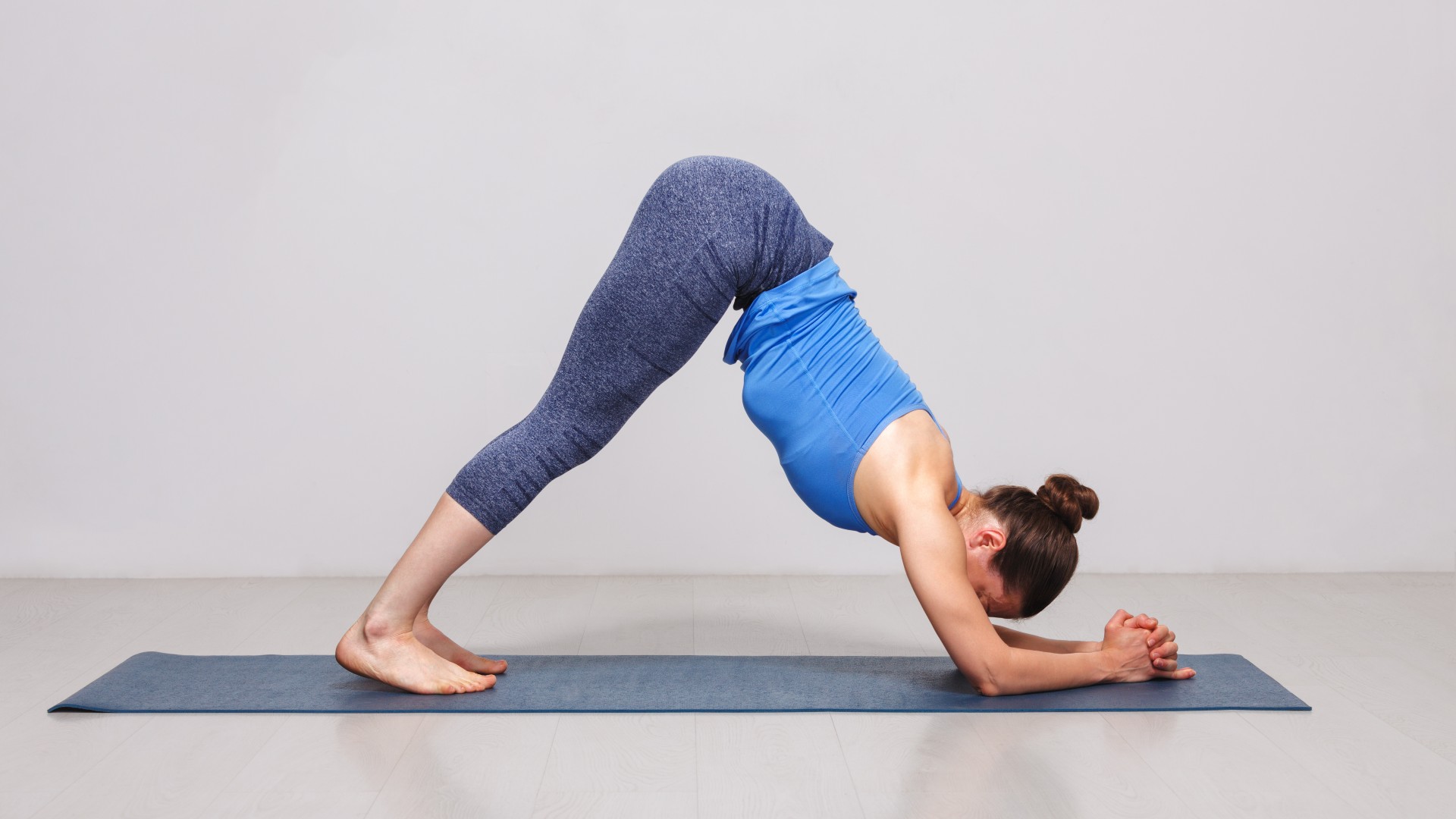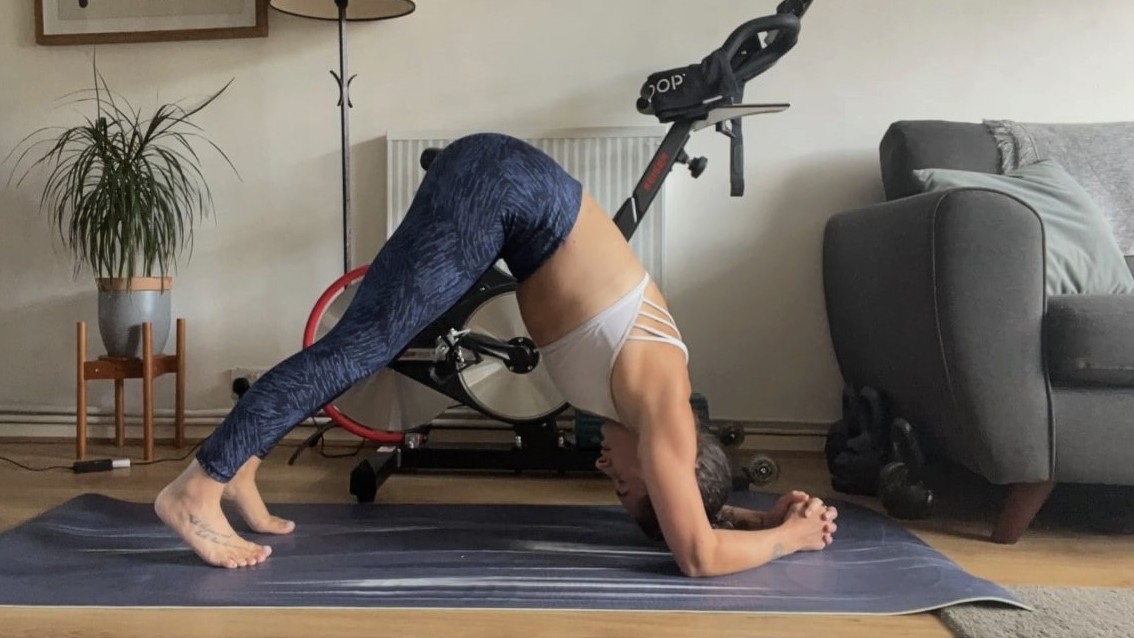
If you haven't tried or even heard of the dolphin plank before, it's probably for the best. You're going to want to try it, and it's a powerful full-body plank variation best left where it came from — yoga.
Now, I don’t blame the yogis — dolphin planks builds strength, endurance and stamina and train your muscles to work under load without even moving, just like other plank variations. Post challenge, my abs and shoulders feel torched, and I've noticed a difference in my hamstrings. Notably, more flexibility. So, I guess I should be saying thank you?
To do the dolphin plank, start in a forearm plank position, clasp your hands together in front of your head (which can be resting on the ground or lifted) and send your hips toward the ceiling and backward. Like downward dog, but on your elbows and far less comfortable.
Grab one of the best yoga mats to rest on if you plan to try it, and find out what else happened when I did a 7-minute dolphin plank every day for a week and why this fitness challenge surprised me.
How to do the dolphin plank exercise
Like most of the best plank variations tried at Tom’s Guide, we cover the benefits and common mistakes of the exercise in our how-to dolphin plank lowdown here.
If your hamstrings are tight, softly bend both knees and keep your spine straight without rounding your back.
How:
Get instant access to breaking news, the hottest reviews, great deals and helpful tips.
- Start in a forearm plank and engage your stomach, glutes, quads and shoulders
- Push your hips back and upward, resting your weight between the balls of your feet and drawing your heels toward the mat
- Keep your forearms pressed down, then clasp your hands together behind your head
- If you prefer, rest the top of your head on the mat between your elbows
- To make the move harder, lift your head away from the floor.
I did a 7-minute dolphin plank every day for a week — here are my results
Here's what happened when I did a 7-minute dolphin plan every day for a week.
My shoulders, arms and abs were on fire
I can hold a plank with the best of them, but the dolphin plank will humble you. Forget more than a minute in this pose, I told myself, breaking it down to seven sets of 60 seconds. And even that was tough.
The yoga asana, known as dolphin plank pose, is an isometric ab exercise (an exercise where your muscles don’t move through a range of motion) and strengthens your arms, shoulders and core muscles. Boy, I felt it.
I got a great stretch down my hamstrings
The beauty of this plank is that your hip positioning (lifted rather than aligned with your shoulders) emphasizes your hamstrings and calves, giving them a good stretch.
In yoga, the dolphin is a popular transition to headstand, as you begin walking your feet toward you while lifting your hips as high as possible. In theory, you can brace your core nice and tight, then slowly raise one leg at a time.
Rather than balancing on my head, I used it as a chance to deepen the stretch in my hamstrings and pack on more intensity in my ab muscles.

My shoulders hurt
I must be mindful of any fitness challenges I undertake due to a past left rotator cuff injury; this was no exception. The dolphin plank requires weight-bearing in the upper body to maintain position, and although you should try to center your balance between your feet and elbows, your arms and shoulders are the main focus of the exercise.
I changed the format
By midweek, the minutes were seriously adding up, and I could feel the DOMS building in my stomach, upper back and shoulders. If you’re new to the dolphin plank, I wouldn’t recommend going in at 7 minutes. Instead, try 30 seconds to a minute at a time and build from there.
Toward the end of the week, I noticed I could hold for slightly longer before the muscle burn hit, and I managed to control my breathing better. At this point? Time to mix things up.
Active dolphin — commonly used as an ab exercise rather than during yoga — involves moving between forearm plank and dolphin pose. It was a chance to introduce light cardio and add intensity, but it also helped me stretch and stabilize my shoulder joints, hips and legs.
I did a 7-minute dolphin plank exercise every day for a week — here’s my verdict
Whenever I hear my yoga teacher say the dreaded words “dolphin pose,” I groan. But after a week of doing them for seven minutes every day, I feel more confident and definitely (marginally) stronger.
I’ve noticed my form improving and feel more capable of holding my position, even walking my legs closer to my body and lifting one leg at a time higher when practicing the tripod position toward the headstand.
So that’s a big tick for improving my yoga balancing game. But what else did I learn? This one was mind over matter and tested my mindset under pressure. I learned to breathe through it and be humble when I needed to rest — it’s not a competition, after all.
Who knows what could happen after 30 days of dolphin training? Although I think I’ll park it for now.
More from Tom's Guide
- I walked 8,000 steps with the Apple Watch 9 and the Garmin Forerunner 265, here's which is more accurate
- This 3-move bodyweight shoulder workout carves your pecs, shoulders and triceps in 20 minutes
- Forget sit-ups, this 3-move ab workout chisels concrete core muscles in just 15 minutes.

Sam Hopes is a level 3 qualified trainer, a level 2 Reiki practitioner and fitness editor at Tom's Guide. She is also currently undertaking her Yoga For Athletes training course.
Sam has written for various fitness brands and websites over the years and has experience across brands at Future, such as Live Science, Fit&Well, Coach, and T3.
Having coached at fitness studios like F45 and Virgin Active and personal trained, Sam now primarily teaches outdoor bootcamps, bodyweight, calisthenics and kettlebells.
She also coaches mobility and flexibility classes several times a week and believes that true strength comes from a holistic approach to training your body.
Sam has completed two mixed doubles Hyrox competitions in London and the Netherlands and finished her first doubles attempt in 1:11.
 Club Benefits
Club Benefits






